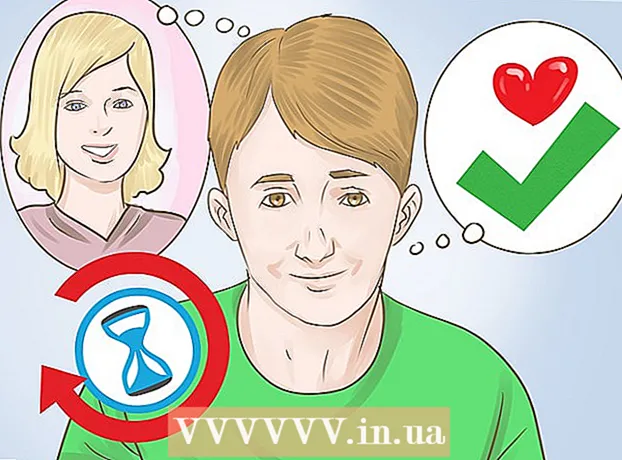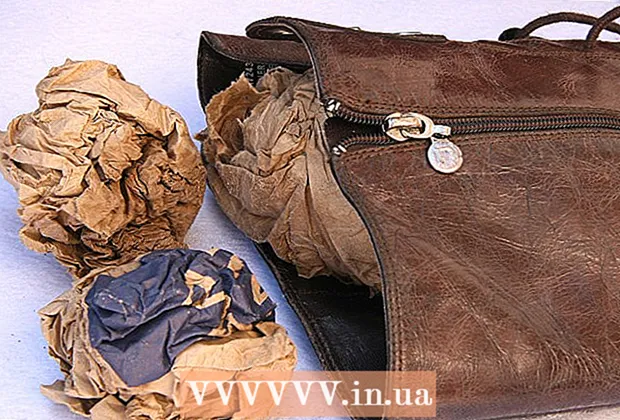Author:
Bobbie Johnson
Date Of Creation:
10 April 2021
Update Date:
1 July 2024

Content
- Steps
- Method 1 of 3: Determining Water Hardness
- Method 2 of 3: Soften water before use
- Method 3 of 3: Installing a water softener system
- Tips
- Additional articles
Hard water is high in minerals, most commonly calcium and magnesium. These minerals leave deposits that can clog drains and stain tiles, can prevent soap from foaming, and can leave marks on hair and skin. Research has found no health hazards from mineral deposits, and has not identified any medical reason for recommending hard water softening, but hard water is a nuisance nonetheless. Read this article to learn about some of the ways to soften hard water.
Steps
Method 1 of 3: Determining Water Hardness
 1 Find out if the water in your area is hard. Water is considered hard if it contains up to 6 mEq / L of salts in the USA, and 9 mEq / L in Russia. In almost all of the European part of Russia, the water is quite hard. This is especially true for the southern regions of the Black Earth Region and Moscow.
1 Find out if the water in your area is hard. Water is considered hard if it contains up to 6 mEq / L of salts in the USA, and 9 mEq / L in Russia. In almost all of the European part of Russia, the water is quite hard. This is especially true for the southern regions of the Black Earth Region and Moscow. - If you have an urban water supply, check the water hardness at the water supply company’s office.
- Even if you have your own drinking water source, contact your local water company for rough information on water hardness. There they can tell you the general source of water, provide some results of the study of water, including the level of its hardness.
- You can donate water for analysis to one of the laboratories in your city. You can also buy a water hardness test and do the analysis yourself.
 2 Pay attention to the degree of foaming of soap, toothpaste, dishwashing detergent, washing powder. If you add enough detergent to the water and there is little foam, your water is likely hard.
2 Pay attention to the degree of foaming of soap, toothpaste, dishwashing detergent, washing powder. If you add enough detergent to the water and there is little foam, your water is likely hard.  3 Decide if you want to soften the water. If you have hard water, this does not mean that you need to soften it. The techniques used to soften hard water can have adverse effects that outweigh the hassles of hard water. If you can easily accept the presence of hard water, then you do not need to soften it, or try to fix the situation without drastic methods and without installing expensive hard water softening systems.
3 Decide if you want to soften the water. If you have hard water, this does not mean that you need to soften it. The techniques used to soften hard water can have adverse effects that outweigh the hassles of hard water. If you can easily accept the presence of hard water, then you do not need to soften it, or try to fix the situation without drastic methods and without installing expensive hard water softening systems. - Ionic water softeners replace mineral ions with sodium ions. So the water becomes softer, because of the salt content in it, it becomes destructive for plants, the soil becomes infertile, such water poisons the reservoirs into which it flows.
- However, soft water will prolong the life of your plumbing and sewer pipes and make housework that involves using soap easier.
- The trade-off is to install a water softener system only on the hot water pipe, so only half of the water you use will be softened.
Method 2 of 3: Soften water before use
 1 Boil water before drinking. Boiled water can also be used to clean the kitchen and bathroom, brush your teeth, wash your face and wash your hair to increase the effectiveness of detergents.
1 Boil water before drinking. Boiled water can also be used to clean the kitchen and bathroom, brush your teeth, wash your face and wash your hair to increase the effectiveness of detergents. - After the water has boiled for a few minutes, let it cool down. Particles visible to the naked eye will form on the surface of the water. Remove the top layer of boiled water and discard it before drinking.
- You can also let the water sit longer and the particles will settle to the bottom of their own accord. Drain off the clean water carefully, taking care not to disturb the sediment at the bottom. Pour the remaining water and particles into a sink.
 2 Soften the water with baking soda or lime. Previously, housewives always softened water by pouring it into barrels and adding washing soda or lime. The water stood for several days, then it was drained and used.
2 Soften the water with baking soda or lime. Previously, housewives always softened water by pouring it into barrels and adding washing soda or lime. The water stood for several days, then it was drained and used. - This method is not used these days due to the fact that it takes too long.
 3 Add ammonia, borax, lye, or washing soda to the water. Add one of these substances to the wash water, soap or other detergent and it will do its job better. These products will not soften the water and will contribute to better foaming. Follow the directions and read the warnings on the packaging carefully.
3 Add ammonia, borax, lye, or washing soda to the water. Add one of these substances to the wash water, soap or other detergent and it will do its job better. These products will not soften the water and will contribute to better foaming. Follow the directions and read the warnings on the packaging carefully. - Dissolve 450 grams of washing soda in 940 ml of boiling water. Store chilled ode in a closed bottle. Take 2 tablespoons of the solution in 3.5 liters of water when you do your home cleaning.
- Dissolve 1/4 tablespoon of lye in one glass of water. Mix the solution with 3.5 liters of water.
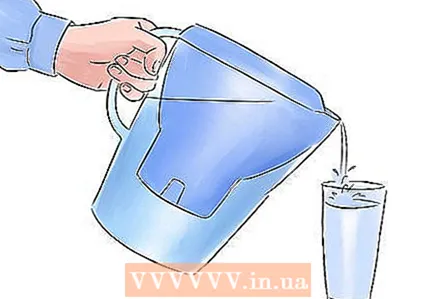 4 Use a filter pitcher to soften drinking water. You can buy it in many stores. Some filters help drinking water, coffee, tea, and other beverages retain their flavor and aroma longer.
4 Use a filter pitcher to soften drinking water. You can buy it in many stores. Some filters help drinking water, coffee, tea, and other beverages retain their flavor and aroma longer.  5 Install the same filter on your kitchen faucet and on your bathroom faucet. This will soften the water flowing out of the tap. This is the easiest way to soften water. Some filter models have a shutdown system, so you can choose whether to soften the water at the moment or not.
5 Install the same filter on your kitchen faucet and on your bathroom faucet. This will soften the water flowing out of the tap. This is the easiest way to soften water. Some filter models have a shutdown system, so you can choose whether to soften the water at the moment or not.
Method 3 of 3: Installing a water softener system
 1 Install a mechanical water softener that replaces calcium and magnesium ions with sodium ions. This is the most effective way to soften very hard water.
1 Install a mechanical water softener that replaces calcium and magnesium ions with sodium ions. This is the most effective way to soften very hard water. - Mechanical water softeners prevent limescale build-up, increase water heating efficiency, and extend the life of your clothes and items you regularly clean.
- There are different water softeners on the market, from different price categories, different in the way of application and effectiveness. You should test softened water before drinking it.
 2 Install a magnetic water softener. Such a device changes the calcium ions so that it cannot form scale.
2 Install a magnetic water softener. Such a device changes the calcium ions so that it cannot form scale. - Water conditioners are cheaper, easier to use, and you can drink water after using them.
- Air conditioners are not always effective for softening hard water; they do not provide any guarantees. Some question whether these air conditioners actually work. The degree of softening of the water depends on the method by which it was softened.
Tips
- Softening the water will lead to immediate savings in detergent, because with soft water you will need a small amount of detergent, from toothpaste to detergent, and the results will be better. Electricity consumption will also decrease, because washing and cleaning will take place faster and less often. Soft water can extend the life of your water pipes and appliances, and even the things you clean and wash.
- Almost all water softening methods require money, and these costs do not always pay off. Some water softening methods require upfront payments, some are included in recurring costs. However, you must remember that water softening saves money.
Additional articles
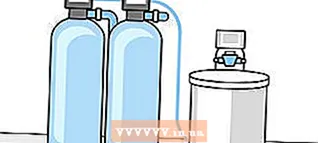 How to remove plaque from hard water
How to remove plaque from hard water 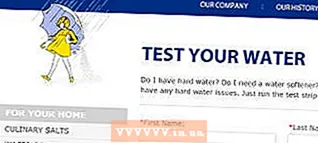 How to determine water hardness How to remove hard water stains from windows
How to determine water hardness How to remove hard water stains from windows  How to make a fly trap
How to make a fly trap  How to get rid of ladybugs How to get rid of bees
How to get rid of ladybugs How to get rid of bees 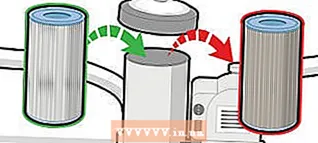 How to find out how many hours to filter a pool
How to find out how many hours to filter a pool  How to remove chlorine odor from hands
How to remove chlorine odor from hands  How to get rid of hornets
How to get rid of hornets  How to remove paint from artificial leather
How to remove paint from artificial leather  How to remove urine odor from a concrete surface How to make lavender oil
How to remove urine odor from a concrete surface How to make lavender oil  How to Throw Your Old Knives Safely
How to Throw Your Old Knives Safely 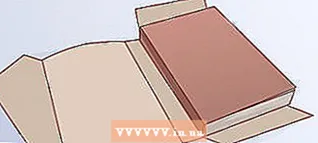 How to remove mold odor from books
How to remove mold odor from books

